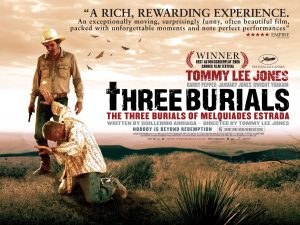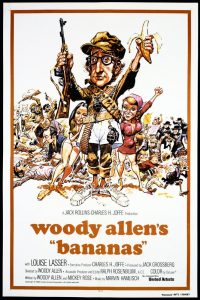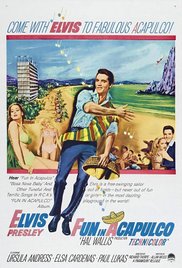I am certainly still processing “The Three Burials of Melquiades Estrada” but it was clear as soon as the film was over that this was a beautiful picture. I felt a human quality to so many of the  characters that we haven’t necessarily seen in our previous films. In the way that Rachel is able to separate her sex life from her husband, yet struggles to understand her own emotions towards Bob and Pete, in the way that Lou Ann requires Mike to murder someone before deciding to leave him, or in the way that Pete is clearly maddened by the death of his friend Mel to the point that he cannot think of anything but bringing him home to his family and bringing justice to his death. I felt as though so many of the characters were struggling to accept realities they knew were true for themselves, and it took some hard hitting moments to face the facts.
characters that we haven’t necessarily seen in our previous films. In the way that Rachel is able to separate her sex life from her husband, yet struggles to understand her own emotions towards Bob and Pete, in the way that Lou Ann requires Mike to murder someone before deciding to leave him, or in the way that Pete is clearly maddened by the death of his friend Mel to the point that he cannot think of anything but bringing him home to his family and bringing justice to his death. I felt as though so many of the characters were struggling to accept realities they knew were true for themselves, and it took some hard hitting moments to face the facts.
This I felt was most true in the final scene in which Pete “discovers” the town that Mel was from as a way of mentally allowing himself to feel at peace with burying his friend. He came to this stony hedge in the middle of a valley with no one in sight and convinced himself by “convincing” Mike that he had found the town of Jimenez. In this way I felt that he had realized consciously or subconsciously that he was not going to find Mel’s home, but that he still needed to give him a home. This in some ways was the most beautiful point of the movie for me. I can’t quite explain why but his desperation to bury Mel in the resting place of his family was so necessary for Pete that he had to also believe that he had found it. After witnessing the first burial of Mel (in a bush, being eaten by a coyote), followed by being covered in dirt by a crane, he truly was given a sacred burial.
I think the aspect of the film I found the most confusing was the character of Mike. From the beginning of the film, I had a hard time pegging down his intentions. It was clear that he was a dominant/aggressive male who felt he needed to keep people in line by exerting physical power over them. First depicted by his beating of the Mexican travelers who failed to cross the boarder. Secondly, by the way he questionably raped his wife. My perspective of that scene depicted a woman (Lou Ann) who knew that she couldn’t fight or get away from him. Her face looked numb as if this was routine for her. From that moment of the film, I couldn’t think of one reason why she would stay with him other than that she didn’t know what it was to be independent (likely more about her character than his). His actual murder of Mel didn’t actually seem very violent to me. He clearly was caught off guard while jerking off to porn and didn’t think of considering why else he would have heard gun shots other than as an attack on his life. However, the fact that it was a Mexican and not a white American who was holding the gun likely allowed him to have less uncertainty about the intentions of the shooter due to the blatant racism displayed by American boarder guards towards Mexicans. I think the thing that confused me the most about his character was if he truly did feel the need to repent by the end of the film. As other students noted, he did seem as though he was upset by watching the soap opera out in the dusty skirts of Mexico, however I feel that this could also be seen as him missing home, just as much as feeling guilt towards the treatment of his wife. I’m not sure that I believe that argument, but I think its possible. He also refused to ask forgiveness to Mel/his family once they’d buried him until Pete literally shot at him (he didn’t have any bullets but Mike wasn’t aware of that). I was also uncertain about his final question at the end to Pete along the lines of ‘are you going to be alright?’ which I felt was more of a reflection of how he felt about himself than Pete. Clearly Pete was capable of surviving in Mexico much better than Mike.
This post has turned into a bit of a rant, but this is all to say that I felt there were many interpretations of the actions of the characters in this film and I am excited to hear everyone’s perspectives in class.
 I must say, the title of this film is very apt. From the scene where Fielding is talking to his therapist about being repeatedly electrocuted as a child by his heated blanket, to his masquerade across San Marcos and becoming their figurehead, to his fantastical, on and off, yet very dry relationship with Nancy, this film could be summed up in one word: bizarre. Yet, beneath its slap stick/ dead pan exaggerated humour (which I didn’t think could coexist, yet arguably function quite well together in this film), I felt that “Bananas” was very successful in poking fun at some of the realities of politics, romance, and society.
I must say, the title of this film is very apt. From the scene where Fielding is talking to his therapist about being repeatedly electrocuted as a child by his heated blanket, to his masquerade across San Marcos and becoming their figurehead, to his fantastical, on and off, yet very dry relationship with Nancy, this film could be summed up in one word: bizarre. Yet, beneath its slap stick/ dead pan exaggerated humour (which I didn’t think could coexist, yet arguably function quite well together in this film), I felt that “Bananas” was very successful in poking fun at some of the realities of politics, romance, and society. president and held a calm composure. He depicted the event as being quite normal, to the point that he went up to talk to the president about it after he had been shot, and finished his conversation by saying something along the lines of ‘well good luck to you.’ In comparison to coverage of American politics, I doubt something like that would ever be shown so publicly on television, especially with such a normalcy to the way the news caster made the event come across. I recognize that this was fictional and exaggerated, but still could be representative of the way in which Americans/Westerners view other societies with more of a gaze of feeling the authority / privilege to invade on their private matters and publicize them with their own perspective attached, which can normalize violence amongst other things in other countries.
president and held a calm composure. He depicted the event as being quite normal, to the point that he went up to talk to the president about it after he had been shot, and finished his conversation by saying something along the lines of ‘well good luck to you.’ In comparison to coverage of American politics, I doubt something like that would ever be shown so publicly on television, especially with such a normalcy to the way the news caster made the event come across. I recognize that this was fictional and exaggerated, but still could be representative of the way in which Americans/Westerners view other societies with more of a gaze of feeling the authority / privilege to invade on their private matters and publicize them with their own perspective attached, which can normalize violence amongst other things in other countries. desirable from the first scene of the film, yet his actual success did not occur until scenes later when he performed his first successful gig as the replacement for a hotel performer. Almost every eligible woman in the film essentially throws themselves at him with no regard for his disinterest in commitment. This was most evident in his relationships with Dolores and Margarita whom are both more or less aware of his relation with the other, yet continue to pursue him. This was especially surprising to see from the character, Dolores, as she was depicted throughout the film as very dominant and assertive. When the audience and Mike are introduced to her at the bar in Acapulco, she is literally wearing pants – which we can see later can apply direct transference to “wearing the pants in the relationship” (ex. driving Mike to the make out spot, pursuing dates with him etc.). Overall I saw this unjustified adoration of Mike as something that the film makers believed would be accepted by the audience because they would know it was Elvis before getting to know Mike Windgreen, the character. Therefore, as the audience was already attracted to, and impressed by Elvis Presley, Mike Windgreen was able to take on a similar perception right away, rather than having to demonstrate tangible success prior to gaining this attractive/impressionable status.
desirable from the first scene of the film, yet his actual success did not occur until scenes later when he performed his first successful gig as the replacement for a hotel performer. Almost every eligible woman in the film essentially throws themselves at him with no regard for his disinterest in commitment. This was most evident in his relationships with Dolores and Margarita whom are both more or less aware of his relation with the other, yet continue to pursue him. This was especially surprising to see from the character, Dolores, as she was depicted throughout the film as very dominant and assertive. When the audience and Mike are introduced to her at the bar in Acapulco, she is literally wearing pants – which we can see later can apply direct transference to “wearing the pants in the relationship” (ex. driving Mike to the make out spot, pursuing dates with him etc.). Overall I saw this unjustified adoration of Mike as something that the film makers believed would be accepted by the audience because they would know it was Elvis before getting to know Mike Windgreen, the character. Therefore, as the audience was already attracted to, and impressed by Elvis Presley, Mike Windgreen was able to take on a similar perception right away, rather than having to demonstrate tangible success prior to gaining this attractive/impressionable status.